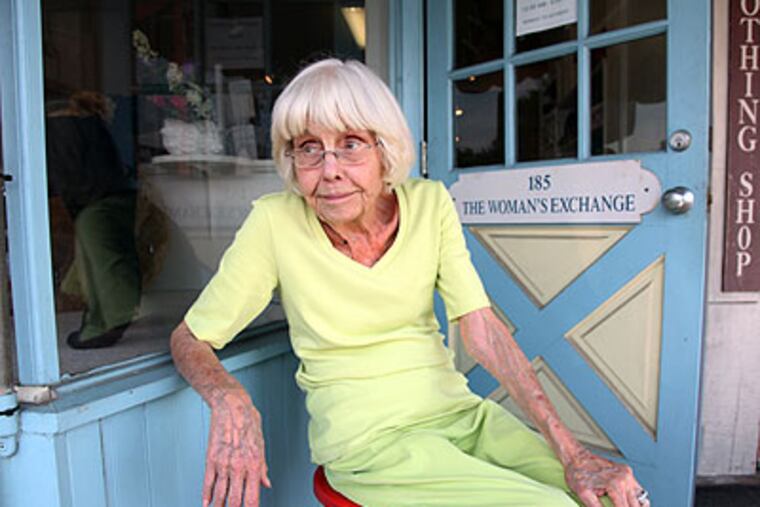Wayne Woman's Exchange closing its doors
Karen Pierce was examining two hand-painted wine glasses in the Wayne Woman's Exchange when the manager gave her the bad news: The shop was closing at the end of June.

Karen Pierce was examining two hand-painted wine glasses in the Wayne Woman's Exchange when the manager gave her the bad news: The shop was closing at the end of June.
"Oooh, you're leaving?" asked Pierce, a regular customer, sounding genuinely sad. "How long have you been here?"
Since the height of the Great Depression - 1932 - when the Lancaster Avenue gift store opened as part of the Federation of Woman's Exchanges, places where women could sell handwork and homemade goodies to earn extra cash.
The first exchange was founded in Philadelphia in 1832 - quaintly named the Philadelphia Ladies' Depository - launching one of the nation's oldest continually operating charitable movements. Talented consignors made money from the sale of their work, and the stores poured the profits back into the community.
By the end of the 19th century, there were 73 exchanges from Los Angeles to Newport, R.I. By the end of the 1930s, there were 46 stores, of which 19 remain, including one in Reading.
Exchanges are a throwback to a genteel era when most women knew how to knit, sew, and cook - and had the time to do it. Many became entrepreneurs; Mrs. Fearnow's Brunswick Stew was sold at the Richmond, Va., exchange before becoming a multimillion-dollar business.
Nowadays, there aren't enough consignors or volunteers to keep the business going, said Sue Finn, manager of the Wayne store for 40 of her 83 years.
"We aren't making enough to cover our bills," said Finn, who oversees about 20 volunteers, down from 60 at the peak 15 years ago.
The decision to close was made at the May board meeting, and consignors were notified two weeks ago. The last day will be June 30.
Many exchanges are struggling as shoppers visit eBay and volunteers return to the workplace, federation president Joan Wilson said. But a few are thriving as a new generation of crafters find an outlet for their handwork.
Successful stores "change with the times and have a lively volunteer base," said Wilson, citing an exchange in Dallas whose sales are "in the millions."
Wilson, who started volunteering at a store near Boston seven years ago, said she worried that the exchanges wouldn't survive.
"I have been a consummate optimist, believing in the old adage 'Where there's a will, there's a way,' but the more news I hear, the more I wonder if any of us will be around to tell the tale of a movement that gave women hope, that supported women's issues, that, ultimately, helped women to help themselves," she wrote in an e-mail.
On a recent afternoon, Finn and volunteers Leone Verkes and Joyce Apple took toys, dolls, dresses, and baby blankets off shelves to send back to consignors.
One thing they won't have to return are the homemade cookies, the store's biggest seller. At Christmas, customers gobble up 100 pounds or more.
The thin, crispy cookies, which cost $12 a pound, filled large glass storage jars that looked like they belonged on the shelf of an old-time general store.
Next to them was a freezer with a few individually packaged handmade dinners that were right off a 1930s menu: shepherd's pie, meat loaf, chicken divan, potato supreme. At Thanksgiving, customers could buy fully cooked turkeys, gravy, and stuffing.
"I have one guy who will cry for shepherd's pie," Finn said.
The store was the first place where the now internationally famous Byers' Choice Carolers were sold, Finn said proudly. She remembers company founder Joyce Byers walking into the exchange more than 30 years ago and asking if she could sell her Christmas figurines.
The exchange is even mentioned in a video that Byers shows at its Chalfont headquarters, Finn said.
"We're going to have to pass out the Kleenex," she said.
By the time Pierce was done shopping, she had spent close to $100 on several one-of-a-kind items, including a white hand-knit baby sweater, a wooden pull caterpillar, and the wine glasses, plus mini-quiches and sticky buns. What she had come for, a snack mix called Nuts and Bolts that her family gobbles up, was all gone. But Finn promised to order some for her before the store closed.
If only more customers were like Pierce, a volunteer noted wistfully, the exchange might have survived.
"You got that right, honey," said Finn.